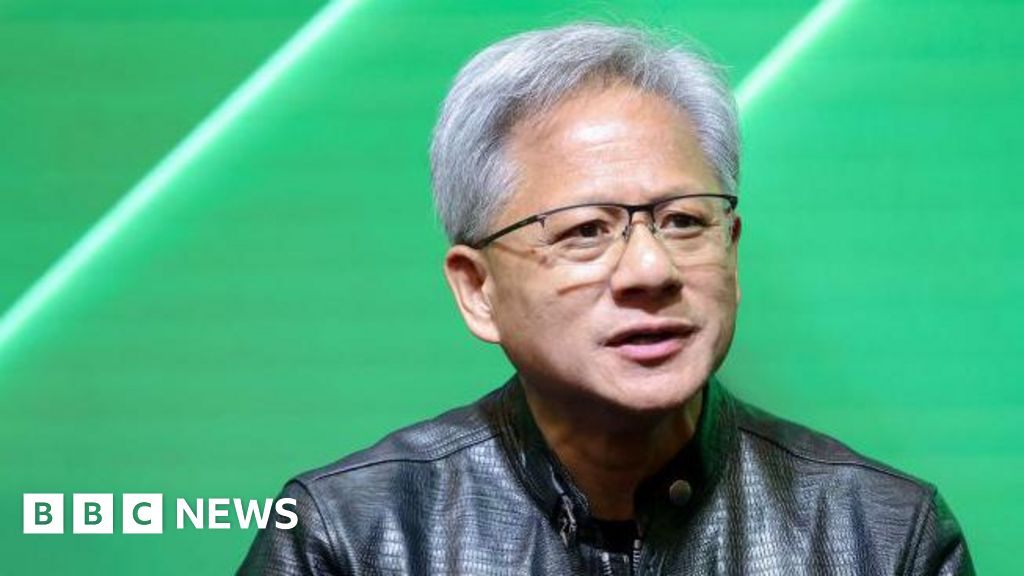Image source, Getty Images
- Author, Zoe Kleinman
- Role, Technology Editor
Last month, AI chip giant Nvidia briefly became the richest company in the world, overtaking Microsoft, which had in turn surpassed Apple.
When this news came up at a tech industry event I attended in Copenhagen, there was spontaneous applause from the audience.
As I write this, Nvidia is back in second place, after its share price fell to $3 trillion (£2.4 trillion), compared to $3.4 trillion for Microsoft.
Two things have taken these two American tech giants to such dizzying heights: AI and foresight.
Microsoft began investing in OpenAI, the maker of the popular AI chatbot ChatGPT, in 2019. Meanwhile, Nvidia CEO Jensen Huang pushed his company to develop AI chips, years before generative AI came onto the scene.
Both companies took a long-term bet on the current AI boom — and so far it’s paid off, leaving former CEO Apple behind. But how long will it last?
This year’s London Tech Week, an annual event for the UK tech scene, could easily have been called London AI Week. The letters AI were on every stand and were spoken in every talk.
I bumped into Anne Boden, the founder of Starling Bank, a major fintech disruptor, and she was bubbling with enthusiasm.
“We thought we knew who the winners and losers were [in tech]“, she told me. “But with AI, we’re rolling the dice again.”
She believes she is witnessing the AI revolution that is changing the technology industry, and she is eager to dive back in.
That same week, I also went to Founders Forum, an annual gathering of about 250 high-level entrepreneurs and investors. In other words, serious money. It’s a confidential event, but I don’t think I’ll get in trouble for saying that a lot of the chat there was also about AI.
Life does indeed move very fast.
Image source, Getty Images
“Given the high valuations of technology companies, future missteps could cause large swings in share prices,” warns Susannah Streeter, head of money and markets at investment firm Hargreaves Lansdown.
“As with the dotcom bubble, there is a risk that over-enthusiasm turns into disappointment.”
In 2023, you might think that anything with the acronym AI in it would be a guaranteed lucrative source of funding, and that there would be massive investment in all things AI.
My friend Saurabh Dayal, who lives in Scotland, identifies AI projects that his pharmaceutical company could potentially collaborate on.
He said he quickly grew tired of misleading sales pitches.
“I often say, ‘…but that’s not AI,’” he tells me.
It seems that both investors and customers are finally understanding the term AI and are therefore becoming more discerning.
In addition, there is a growing awareness that current generative AI products are not exactly living up to their own expectations. Inaccuracies, misinformation, displays of bias, copyright infringements, and some content that is just plain weird.
And the first physical devices with AI, like the Rabbit R1 and the Humane Pin, received poor reviews.
“We see the generative AI market maturing a bit now. Early experiments raised expectations, but when push came to shove, there were too many unexpected outcomes,” said Chris Weston, Chief Digital and Information Officer at tech services company Jumar.
“Companies place a lot of value on goodwill – the trust and comfort their customers have in their services. Introducing uncontrollable chatbots is a step too far for many at this point.”
Tech analyst Paolo Pescatore agrees that AI companies are under pressure to deliver on their promises. “The bubble will burst as soon as one of the giants doesn’t show meaningful growth in AI,” he says.
But he doesn’t believe this will happen anytime soon.
“Everyone is still fighting for position and all companies are basing their strategies on AI,” he adds.
“All players are expanding their activities, increasing their spending and achieving early successes.”
Image source, Getty Images
There’s another reason why the AI bubble might burst. It has nothing to do with the quality of the products or their market value. It’s whether the planet can afford it.
A study published last year found that the AI industry could consume as much energy as a country the size of the Netherlands by 2027 if growth continues at its current rate.
I interviewed Prof. Kate Crawford from the University of Southern California for the BBC’s Tech Life podcast, and she told me that she lies awake at night worrying about the amount of electricity, energy and water needed to power AI.
Dr. Sasha Luccioni of the machine learning company Hugging Face is also concerned.
“There simply isn’t enough renewable energy to power AI right now. Most of that bubble is fueled by oil and gas,” she says.
The hope is that the technology can be used to identify solutions to sustainability, such as the secret of nuclear fusion, the way the sun gets its energy. But that hasn’t happened yet, and in the meantime, “AI systems are putting enormous pressure on energy networks that are already under immense strain,” Dr. Luccioni adds.
With so much uncertainty, few would bet on another shakeup among the world’s richest companies. But right now, Apple has a fight on its hands to catch up with Microsoft and Nvidia in the AI race.
